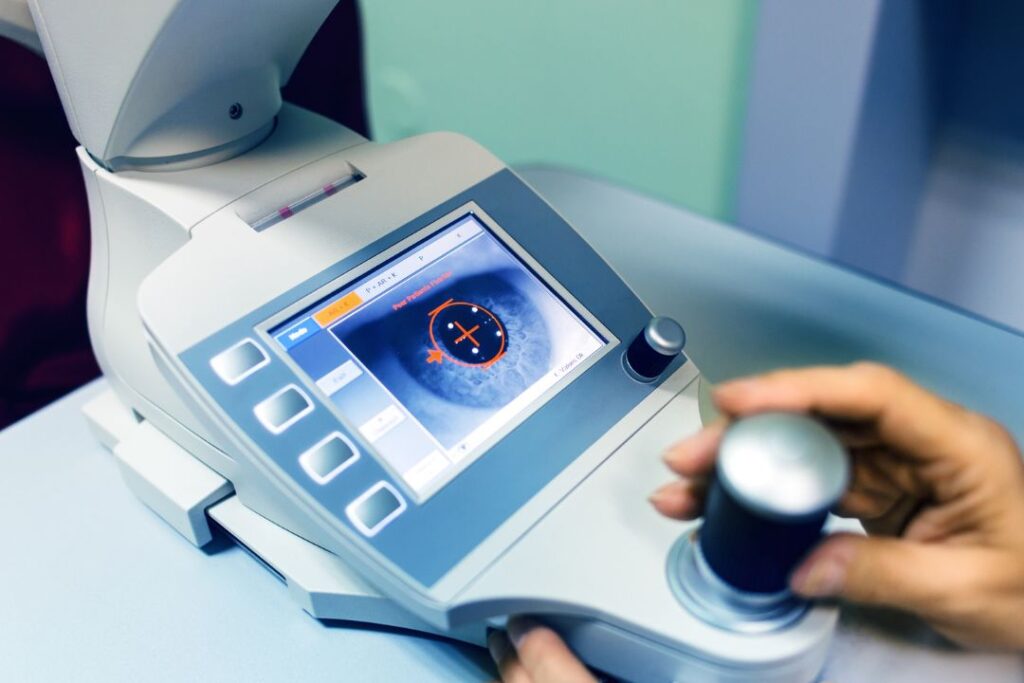Laser Eye Surgery has become increasingly popular in recent years as a way to correct vision problems and eliminate the need for glasses or contact lenses. However, along with its rise in popularity, a number of myths and misconceptions have also emerged. In this article, we will explore the truth behind these myths and separate fact from fiction when it comes to Laser Eye Surgery.
Understanding Laser Eye Surgery
The Basics of Laser Eye Surgery
Laser Eye Surgery, also known as refractive surgery, is a procedure that uses a laser to reshape the cornea in order to correct vision problems such as nearsightedness, farsightedness, and astigmatism. The cornea, which is the clear front surface of the eye, plays a crucial role in focusing light onto the retina, allowing us to see clearly.
During the procedure, the surgeon uses a laser to remove a small amount of tissue from the cornea, thereby changing its shape and improving the way light is focused onto the retina. This results in clearer vision without the need for glasses or contact lenses.
Laser Eye Surgery has revolutionized the field of ophthalmology, offering millions of people the opportunity to achieve better vision and reduce their dependence on corrective eyewear. The procedure has gained popularity due to its high success rates and minimal invasiveness.
Before undergoing Laser Eye Surgery, patients undergo a comprehensive eye examination to determine their eligibility for the procedure. Factors such as corneal thickness, refractive error, and overall eye health are taken into consideration to ensure the best possible outcome.
Once deemed suitable candidates, patients are provided with detailed information about the procedure, including the potential risks and benefits. This allows them to make an informed decision about whether to proceed with the surgery.
The Evolution of Laser Eye Surgery
Laser Eye Surgery has come a long way since its inception. In the early days, a procedure known as PRK (Photorefractive Keratectomy) was the most common form of Laser Eye Surgery. PRK involved the removal of the epithelium, a thin layer of protective tissue on the surface of the cornea, before reshaping the underlying cornea with a laser.
Although PRK was effective in correcting vision, it had a longer recovery time compared to more modern techniques. Patients experienced discomfort and blurry vision for several days or even weeks after the surgery. However, advancements in technology and surgical techniques led to the development of LASIK.
Today, a more advanced form of Laser Eye Surgery called LASIK (Laser-Assisted in Situ Keratomileusis) is the most widely performed procedure. LASIK involves the creation of a thin flap in the cornea, which is then lifted to expose the underlying tissue. The laser is then used to reshape the cornea, and the flap is repositioned, acting as a natural bandage and reducing the recovery time. You can aslo read about How to be calm before you go for LASIK by visiting https://relief-anxiety.info/how-to-be-calm-before-you-go-for-lasik/

LASIK has revolutionized the field of refractive surgery, providing patients with a quicker recovery period and improved visual outcomes. The procedure is highly precise and customizable, allowing surgeons to tailor the treatment to each individual’s unique eye characteristics.
Over the years, LASIK technology has continued to advance, with the introduction of wavefront-guided LASIK and femtosecond lasers. These advancements have further improved the accuracy and safety of the procedure, resulting in even better visual outcomes for patients.
It is important to note that while LASIK is the most common form of Laser Eye Surgery, there are other variations available, such as LASEK (Laser-Assisted Subepithelial Keratectomy) and SMILE (Small Incision Lenticule Extraction). These procedures offer alternative options for patients with specific eye conditions or preferences.
As technology continues to evolve, the future of Laser Eye Surgery looks promising. Researchers are constantly exploring new techniques and technologies to further enhance the safety and effectiveness of the procedure. It is an exciting time for the field of refractive surgery as it continues to transform the lives of countless individuals by improving their vision and quality of life.
Common Misconceptions About Laser Eye Surgery
Laser Eye Surgery has become an increasingly popular procedure for individuals looking to improve their vision and reduce their dependence on glasses or contact lenses. However, there are several common misconceptions surrounding this innovative surgery. Let’s take a closer look at some of these myths and misunderstandings.
Myths About the Procedure
One of the most common myths about Laser Eye Surgery is that it is a painful procedure. While some patients may experience minor discomfort or a sensation of pressure during the surgery, the procedure itself is typically painless. Local anesthesia is used to numb the eye, and the surgeon takes every precaution to ensure the patient’s comfort throughout the process.
Furthermore, another myth is that Laser Eye Surgery is only suitable for certain individuals. In reality, the procedure can be performed on individuals of various ages, as long as they meet certain criteria. Factors such as overall eye health, stable vision prescription, and realistic expectations play a role in determining a candidate’s eligibility for the procedure.
It’s important to note that Laser Eye Surgery is a highly personalized procedure. Each patient’s eyes are unique, and the surgeon will tailor the treatment to address their specific needs and concerns. This individualized approach ensures the best possible outcome for each patient.
Misunderstandings About the Results
One common misunderstanding is that Laser Eye Surgery provides instant perfect vision. While many patients do experience significant improvement in their vision immediately after the procedure, it may take some time for the eyes to fully adjust and for the final results to be realized. It’s important to have realistic expectations and understand that individual healing and recovery times may vary. By clicking here you can read about Our research is bringing hope to people affected by vision loss and blindness.
Additionally, another myth is that the results of Laser Eye Surgery are not permanent and that vision can deteriorate over time. In fact, the majority of patients experience long-lasting vision improvement after the procedure. While age-related changes in vision, such as presbyopia, may occur later in life, the effects of Laser Eye Surgery are generally considered to be permanent.
It’s worth mentioning that the success of Laser Eye Surgery depends on various factors, including the patient’s commitment to post-operative care and follow-up appointments. Following the surgeon’s instructions and attending regular check-ups are crucial for maintaining optimal vision and ensuring the long-term success of the procedure.
In conclusion, Laser Eye Surgery is a safe and effective procedure that has helped countless individuals achieve clearer vision and greater freedom from glasses or contact lenses. By dispelling these common misconceptions and understanding the true nature of the procedure, more people can make informed decisions about their eye health and explore the potential benefits of Laser Eye Surgery.
The Truth Behind the Myths
The Realities of the Procedure
Contrary to popular belief, Laser Eye Surgery is a safe and effective procedure. While, like any surgical procedure, it carries some risks, serious complications are extremely rare. The vast majority of patients experience improved vision and a higher quality of life after undergoing Laser Eye Surgery.
Many people are often hesitant to consider Laser Eye Surgery due to concerns about safety. However, it’s important to understand that this procedure has been performed for decades with great success. The technology and techniques used in Laser Eye Surgery have significantly advanced over the years, making it a reliable and trusted option for vision correction.
One of the key factors that contribute to the safety and success of Laser Eye Surgery is the high level of precision involved. The surgeon uses a computer-guided laser to reshape the cornea, correcting any refractive errors that may be present. This level of precision ensures that the treatment is tailored to the unique needs of each patient, minimizing the risk of complications and maximizing the chances of achieving optimal results.
It’s also worth noting that Laser Eye Surgery is a highly individualized procedure. Each patient’s eyes are unique, and the surgeon will tailor the treatment to address the specific vision correction needs of the individual. This personalized approach helps to maximize the success and satisfaction of the procedure.
Expected Outcomes and Potential Risks
Most patients who undergo Laser Eye Surgery achieve significant improvement in their vision. However, it’s important to note that not everyone will achieve perfect vision. While the goal of the surgery is to reduce dependency on glasses or contact lenses, some patients may still require a low prescription for certain activities or under certain conditions.
It’s important to have realistic expectations when considering Laser Eye Surgery. While the majority of patients experience a significant improvement in their vision, it’s essential to understand that the outcome can vary from person to person. Factors such as the severity of the refractive error, the overall health of the eyes, and individual healing responses can influence the final result.
As with any surgical procedure, Laser Eye Surgery does carry some risks. These risks can include dry eyes, temporary visual disturbances such as glare or halos, and the need for additional touch-up procedures. However, it’s crucial to remember that these risks are relatively rare and can often be managed effectively with proper post-operative care and follow-up visits.
Before deciding to proceed with Laser Eye Surgery, it’s important to have a thorough discussion with your surgeon. They will evaluate your individual case, explain the potential risks and benefits, and address any concerns or questions you may have. This open and honest communication will help you make an informed decision about whether Laser Eye Surgery is the right choice for you.
Making an Informed Decision About Laser Eye Surgery
Questions to Ask Your Surgeon
If you are considering Laser Eye Surgery, it’s important to have a thorough consultation with an experienced surgeon. During this consultation, don’t hesitate to ask questions and voice any concerns you may have. Some important questions to consider asking include:
- What are the potential risks and complications of the procedure?
- What is the expected recovery time?
- Will I still need to use glasses or contact lenses after the surgery?
- Are there any lifestyle restrictions following the procedure?
Preparing for Your Surgery
Prior to your Laser Eye Surgery, your surgeon will provide you with detailed instructions on how to prepare for the procedure. This may include avoiding certain medications, such as blood thinners, and arranging for transportation to and from the surgery center. It’s important to follow these instructions carefully to ensure the best possible outcome.
The Future of Laser Eye Surgery
Advances in Technology
The field of Laser Eye Surgery is constantly advancing, with new technologies and techniques being developed. One such advancement is the use of femtosecond lasers, which offer even greater precision and safety during the surgery. These lasers create a smoother corneal surface, reducing the risk of complications and improving visual outcomes.
Another exciting development is the exploration of personalized laser treatments. By analyzing the unique characteristics of each individual’s eyes, surgeons can tailor the laser treatment to achieve even more precise and customized results.
Potential Developments in the Field
In addition to technological advancements, researchers are also exploring potential future applications of Laser Eye Surgery. This includes the use of lasers to treat other eye conditions, such as presbyopia and cataracts. The future of Laser Eye Surgery looks promising, with the potential to improve vision correction outcomes and expand the range of treatable conditions.
In conclusion, Laser Eye Surgery is a safe and effective procedure for correcting vision problems. By understanding the basics of Laser Eye Surgery and debunking common myths and misconceptions, individuals can make informed decisions about their vision correction options. As technology continues to advance, the future of Laser Eye Surgery holds great promise in improving outcomes and expanding the possibilities for vision correction.

